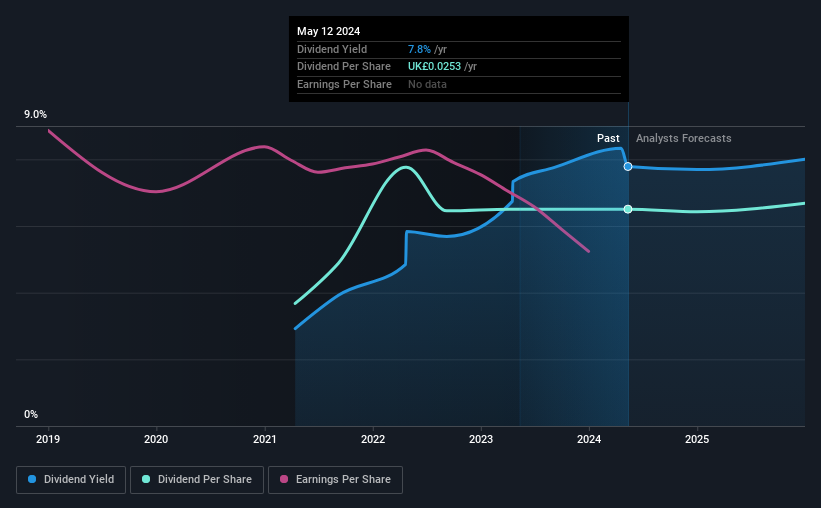Stock Analysis
- United Kingdom
- /
- Diversified Financial
- /
- AIM:VCAP
Do These 3 Checks Before Buying Vector Capital Plc (LON:VCAP) For Its Upcoming Dividend

Readers hoping to buy Vector Capital Plc (LON:VCAP) for its dividend will need to make their move shortly, as the stock is about to trade ex-dividend. The ex-dividend date is one business day before the record date, which is the cut-off date for shareholders to be present on the company's books to be eligible for a dividend payment. The ex-dividend date is of consequence because whenever a stock is bought or sold, the trade takes at least two business day to settle. Therefore, if you purchase Vector Capital's shares on or after the 16th of May, you won't be eligible to receive the dividend, when it is paid on the 3rd of June.
The company's upcoming dividend is UK£0.0153 a share, following on from the last 12 months, when the company distributed a total of UK£0.025 per share to shareholders. Last year's total dividend payments show that Vector Capital has a trailing yield of 7.8% on the current share price of UK£0.325. We love seeing companies pay a dividend, but it's also important to be sure that laying the golden eggs isn't going to kill our golden goose! That's why we should always check whether the dividend payments appear sustainable, and if the company is growing.
View our latest analysis for Vector Capital
Dividends are typically paid from company earnings. If a company pays more in dividends than it earned in profit, then the dividend could be unsustainable. Vector Capital is paying out an acceptable 72% of its profit, a common payout level among most companies. Vector Capital paid a dividend despite reporting negative free cash flow over the last twelve months. This may be due to heavy investment in the business, but this is still suboptimal from a dividend sustainability perspective.
Generally speaking, the lower a company's payout ratios, the more resilient its dividend usually is.
Click here to see how much of its profit Vector Capital paid out over the last 12 months.

Have Earnings And Dividends Been Growing?
When earnings decline, dividend companies become much harder to analyse and own safely. If earnings fall far enough, the company could be forced to cut its dividend. Vector Capital's earnings per share have fallen at approximately 10% a year over the previous five years. Such a sharp decline casts doubt on the future sustainability of the dividend.
Another key way to measure a company's dividend prospects is by measuring its historical rate of dividend growth. Vector Capital has delivered 21% dividend growth per year on average over the past three years. That's interesting, but the combination of a growing dividend despite declining earnings can typically only be achieved by paying out more of the company's profits. This can be valuable for shareholders, but it can't go on forever.
To Sum It Up
Should investors buy Vector Capital for the upcoming dividend? We're not overly enthused to see Vector Capital's earnings in retreat at the same time as the company is paying out more than half of its earnings as dividends to shareholders. Vector Capital doesn't appear to have a lot going for it, and we're not inclined to take a risk on owning it for the dividend.
Although, if you're still interested in Vector Capital and want to know more, you'll find it very useful to know what risks this stock faces. Our analysis shows 3 warning signs for Vector Capital that we strongly recommend you have a look at before investing in the company.
A common investing mistake is buying the first interesting stock you see. Here you can find a full list of high-yield dividend stocks.
Valuation is complex, but we're helping make it simple.
Find out whether Vector Capital is potentially over or undervalued by checking out our comprehensive analysis, which includes fair value estimates, risks and warnings, dividends, insider transactions and financial health.
View the Free AnalysisHave feedback on this article? Concerned about the content? Get in touch with us directly. Alternatively, email editorial-team (at) simplywallst.com.
This article by Simply Wall St is general in nature. We provide commentary based on historical data and analyst forecasts only using an unbiased methodology and our articles are not intended to be financial advice. It does not constitute a recommendation to buy or sell any stock, and does not take account of your objectives, or your financial situation. We aim to bring you long-term focused analysis driven by fundamental data. Note that our analysis may not factor in the latest price-sensitive company announcements or qualitative material. Simply Wall St has no position in any stocks mentioned.
About AIM:VCAP
Vector Capital
Provides finance to the private and corporate sectors in the United Kingdom.
Good value low.

